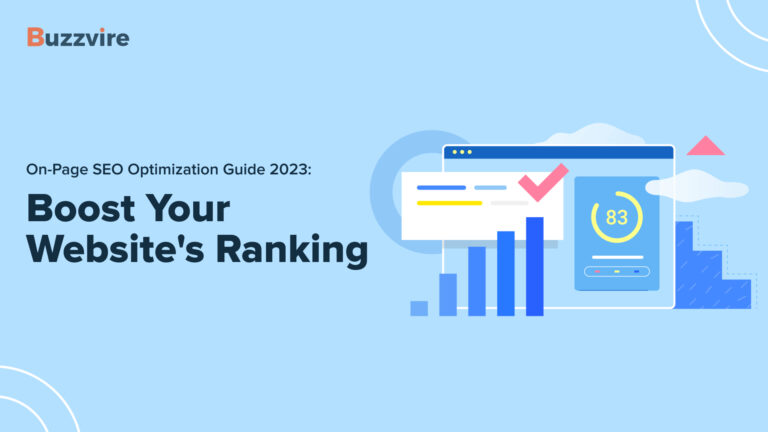
In the vast digital landscape, visibility is paramount for businesses. Visibility among potential customers differentiates businesses from competitors and enables brands to stay one step ahead. The answer to how to achieve visibility among the pool of options available on the internet is Search engine optimization (SEO). Understanding and optimizing SEO rankings is the key to attaining online visibility. It helps leave an impact and catapults the business to growth.
In this blog, we’ll delve into the intricacies of SEO rank and how it is monitored. We’ll shed light on factors that influence SEO ranking, KPIs to track performance, and learn about top SEO rank tracking softwares to track performance.
What is SEO Rankings?
The position of a website or webpage on search engine results pages to a search query is called SEO ranking, also known as search engine optimization ranking. The page’s link is more likely to be seen and generate more traffic and visibility if it appears higher in the search results. Several factors, such as backlinks, website content, and keyword relevancy, determine SEO ranking. To raise your site’s search engine position and increase organic traffic, you should optimize these elements.
On-page SEO
On-page SEO is optimization efforts conducted directly on a website to enhance its visibility and relevance. It involves fine-tuning various elements within the website’s structure and content. Key aspects of on-page SEO include keyword optimization, quality of the content, meta tags, URL structure, internal linking, and image optimization. When talking about on-page SEO, you have complete control over it.
Off-page SEO
Off-page SEO involves optimizing external factors outside the website to influence its search engine rankings. These external factors are crucial in establishing the website’s authority, credibility, and popularity. Vital elements of off-page SEO include backlink building, social signals, online reputation management, brand mentions, influencer outreach, and more. However, you have limited control over off-page SEO.
Importance of Monitoring SEO Rankings

Achieving a high search engine rank is one thing, but maintaining it in the changing search engine dynamics is another. The constant algorithm updates and evolving user behavior make it essential to monitor SEO ranking regularly to hold the position and stay ahead of the curve. It provides insights into a website’s performance, helping businesses adapt strategies to meet changing search engine dynamics.
Six Factors Influencing Your SEO Ranking
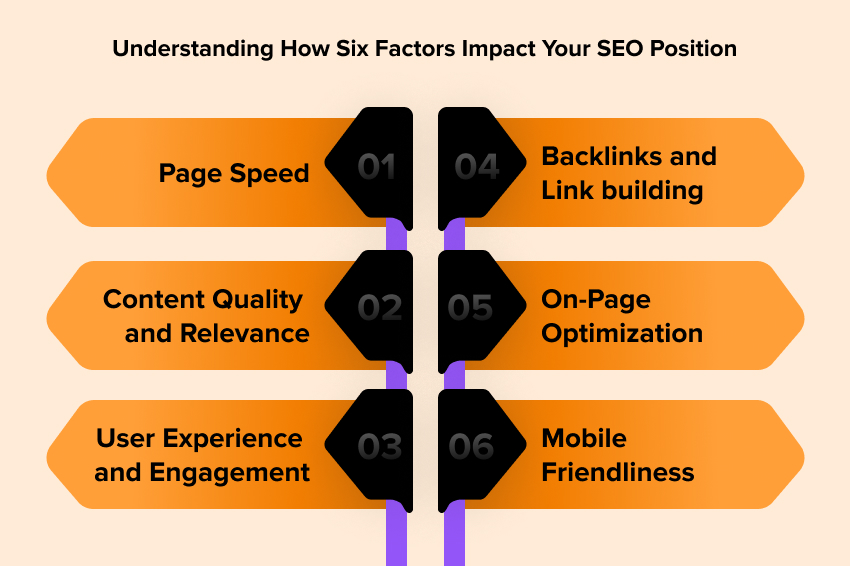
Let’s look at the six key factors that significantly influence SEO rankings.
1. Page Speed: A website’s page loading speed is an important consideration. Reduced bounce rates and improved user experience are two benefits of faster-loading pages. Search engines prefer websites that facilitate rapid and easy surfing priority.
2. Content Quality and Relevance: The foundation of effective SEO is content that is both relevant and of high quality. Search engines give effective replies to user inquiries priority. Using pertinent keywords, offering insightful content, and making sure it is readable are all part of this.
3. User Experience and Engagement: The SEO rankings are influenced by user experience indications, which include low bounce rates, click-through rates, and the amount of time spent on a page. A satisfying user experience suggests the material is worthwhile and pertinent to the audience.
4. Backlinks and Link Building: Incoming links from other websites, or backlinks, are essential to search engine optimization. They are seen as votes of confidence by search engines. Higher ranks are partly attributed to high-quality backlinks from reputable and pertinent websites. But it’s crucial to choose quality over quantity.
5. On-Page Optimization: Using header tags, adding pertinent keywords organically, optimizing meta tags (titles and descriptions), and building a clear URL structure are all examples of on-page SEO elements. These components aid in search engines’ comprehension of each page’s context and content.
6. Mobile Friendliness: Search engines prefer websites optimized for mobile devices owing to the growing usage of these devices. SEO rankings are enhanced by responsive designs that offer a smooth user experience on various devices.
What are the top KPIs to track SEO Performance?
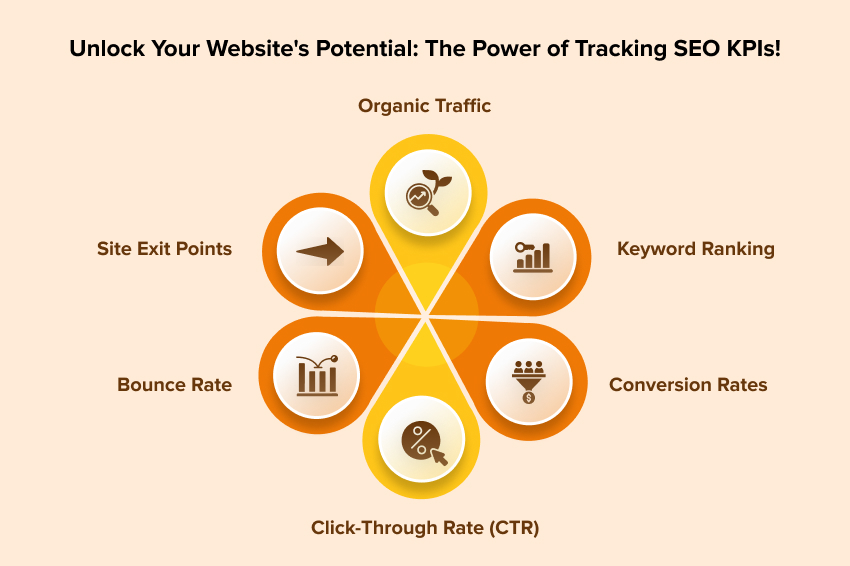
1. Organic Traffic
This refers to the amount of visitors to your website that come from search engine rankings. It is an essential KPI for assessing how visible your website is and how well SEO campaigns are drawing in traffic.
2. Keyword Rankings
The position of your website in search results is indicated by keyword rankings. By keeping an eye on them, you can evaluate the effectiveness of your SEO tactics and make sure that your material is still timely and competitive.
3. Conversion Rates
Conversion rates are a valuable tool for gauging how well your website converts organic traffic into meaningful engagements or purchases. They measure the percentage of visitors who complete desired actions on your site.
4. Click-Through Rate (CTR)
An indicator of how popular and pertinent your content is to consumers. CTR shows the percentage of clicks your website gets compared to how frequently it appears in search results.
5. Bounce Rate
This tells you how many people visit your website and then leave after viewing only one page. It tells you how well your landing pages and user experience work together.
6. Site Exit Points
Site departure points assist you in optimizing pages for increased engagement and a more seamless user experience by identifying the pages from which visitors frequently depart your website.
Top 6 SEO Metrics Tools to Track Performance

1. Google Analytics
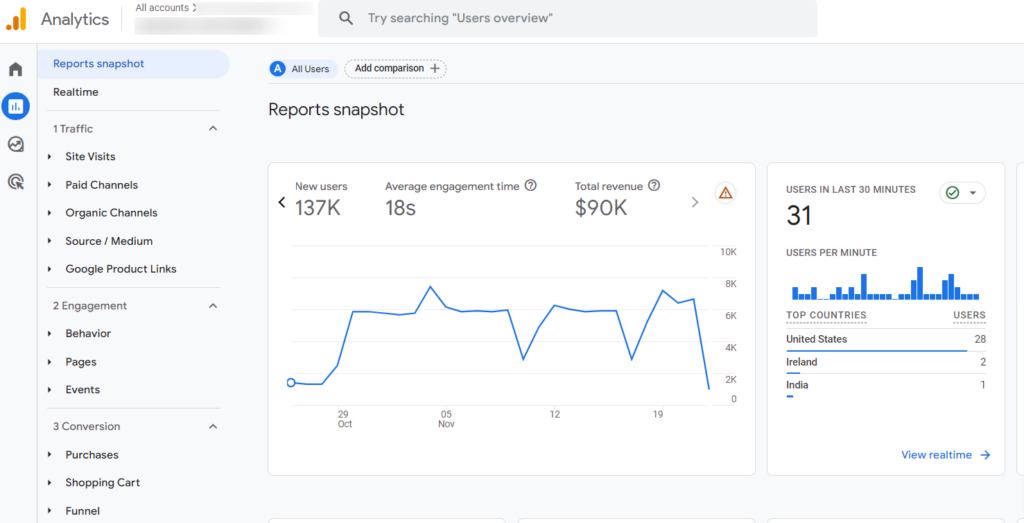
Google Analytics is a feature-rich web analytics tool that offers comprehensive data on website traffic, user activity, and conversions. User demographics, SEO strategy efficacy, and organic traffic are all tracked with its assistance.
2. SEMrush
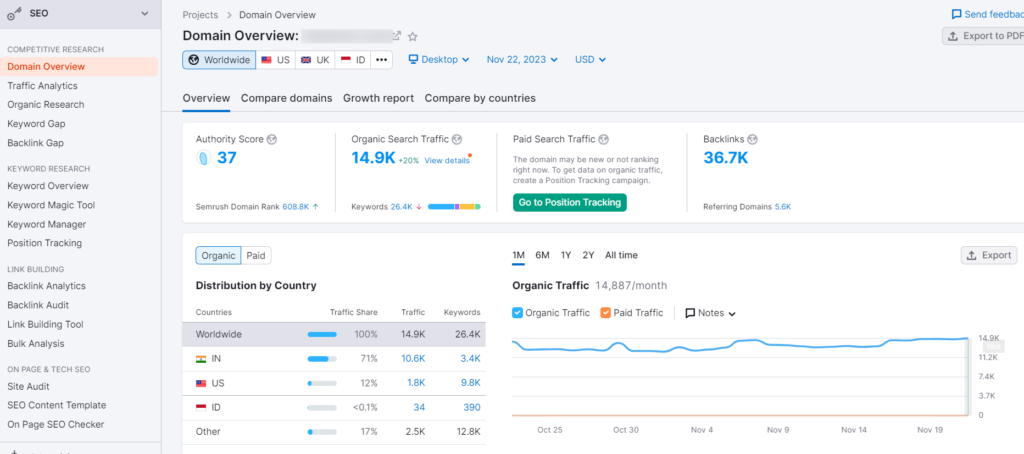
An all-in-one SEO rank tracking software with capabilities including competitor tracking, backlink analysis, site audits, and keyword research. To maintain an advantage in the digital sphere and optimize SEO performance, SEMrush offers useful data.
3. Ahrefs
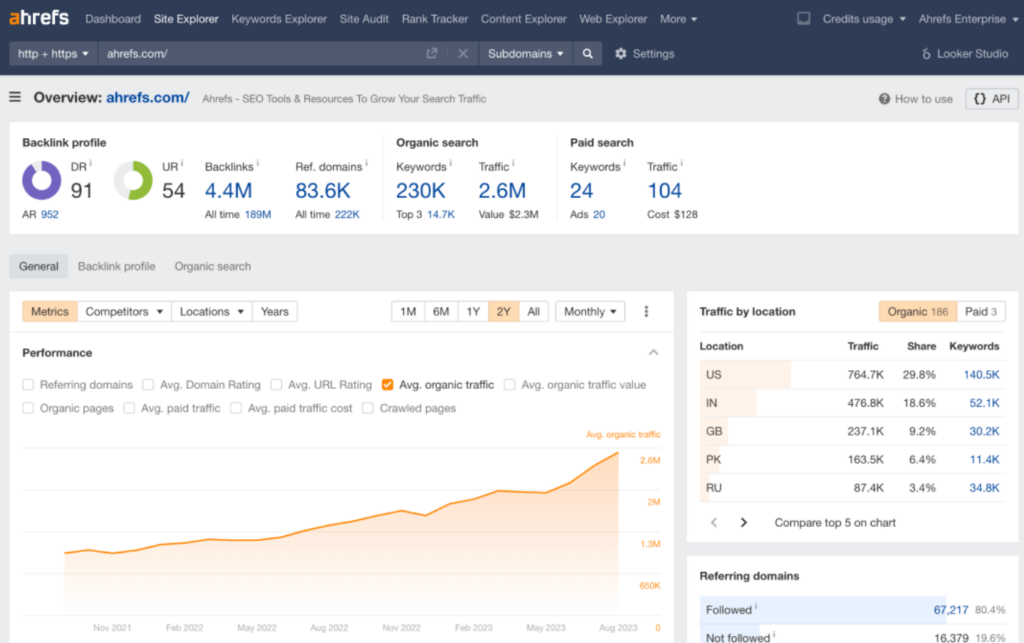
A feature-rich SEO tool and search engine ranking monitor emphasizing competitive insights, keyword research, and backlink analysis. Using Ahrefs, users may find keywords, improve overall website visibility, and comprehend their backlink profile.
4. Moz

Moz provides various SEO tools, such as backlink analysis, site audits, and keyword research. The resources provided by Moz assist companies in raising their search engine ranks and keeping tabs on the market environment.
5. Google Search Console
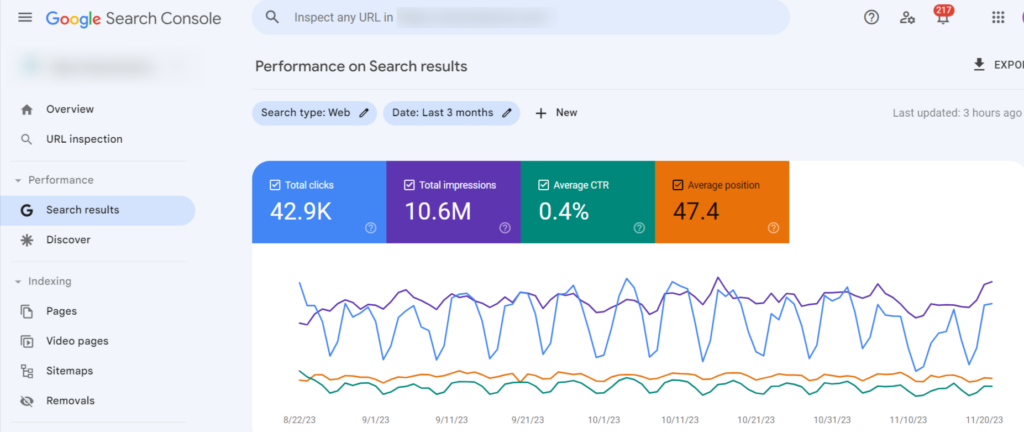
Google Search Console is a free resource offered by Google that enables web admins to oversee and control their website’s visibility in search engine results. It offers details on search terms, indexing status, and problems that could impact the site’s Google visibility.
Tips to Improve SEO Score
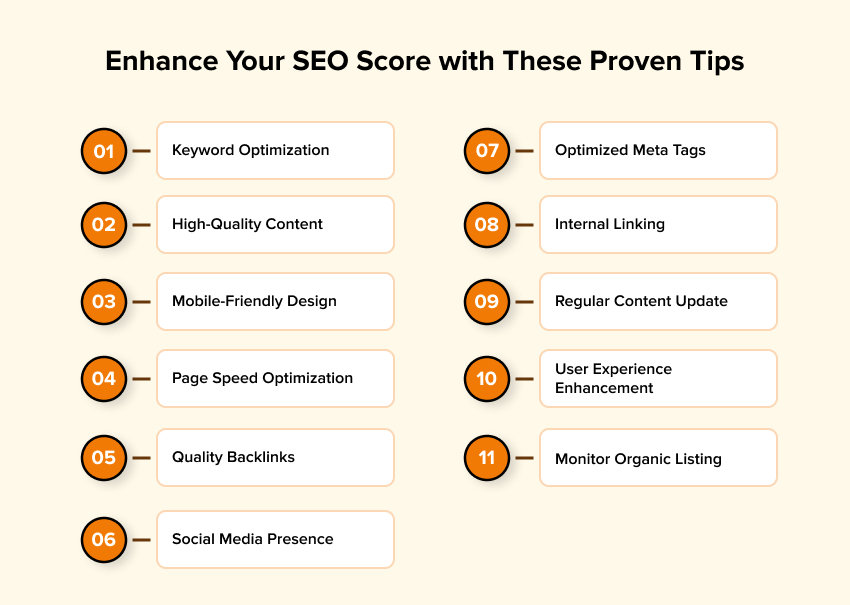
1. Keyword Optimization: For better search engine visibility, do in-depth keyword research and carefully incorporate pertinent keywords into your content, meta tags, and headers.
2. High-Quality Content: Produce insightful, captivating, and methodically organized information. In addition to drawing visitors, high-quality content tells search engines that your website is reliable.
3. Mobile-Friendly Design: Make sure your website is designed and responsive for smaller screens. Sites optimized for mobile devices are given preference in search results.
4. Page Speed Optimization: Enhance the speed at which your website loads. Improved user experience and improved search rankings are two benefits of faster-loading webpages.
5. Quality Backlinks: Develop backlinks of a high caliber from reputable and pertinent websites. Establishing the reputation of your website requires prioritizing quality over quantity.
6. Social Media Presence: Keep an active presence on social media sites. Engagement and shares improve visibility. Therefore, social signals can have an indirect effect on SEO.
7. Optimized Meta Tags: Write intriguing meta descriptions and titles for every page. Meta tags with optimal optimization increase click-through rates and aid search engines comprehending your content.
8. Internal Linking: Provide a structure for internal linking that is rational and easy to use. Adding internal links to your content improves navigation and helps search engines comprehend its structure.
9. Regular Content Updates: Ensure your content is current and fresh. Search engines are informed by frequent updates that your website is live and relevant to users’ current queries.
10. User Experience Enhancement: Make the entire user experience better by emphasizing elements like simple navigation, user-friendly design, and a low percentage of site mistakes. Longer site engagement and higher SEO rankings correlate with a great user experience.
11. Monitor Organic Listing: Regularly monitor organic listing and keep updating and optimizing content and implementing the best SEO practices to stay on top of search results.
By putting all of these suggestions into practice, you may raise your website’s SEO score and improve its performance and search engine results visibility.
In conclusion, the SEO rankings are intricate but pivotal for online success. By comprehending the nuances of on-page and off-page SEO, leveraging effective tools to monitor search engine rankings, and implementing strategic tips, businesses can navigate the dynamic landscape of search engine results. Continuous adaptation and optimization are the cornerstones of a robust SEO strategy, ensuring sustained visibility and growth in the digital sphere.
Frequently Asked Questions (FAQs):
Use tools like Google Search Console, Ahrefs, or SEMrush as your SEO rank monitor to track website rankings. Enter relevant keywords to see the position in search results, providing insights into your site’s visibility and performance.
Utilize SEO ranking trackers or tools such as SEMrush, Ahrefs, or Google Analytics to monitor keyword rankings. Regularly analyze changes in rankings, ensuring your website remains optimized for target keywords and adapts to evolving search trends.
Google monitors a wide range of searches, including queries related to products, services, information, and more. The monitoring encompasses diverse topics, reflecting user interest intent across the spectrum of online searches, and enables monitoring of organic listings.







